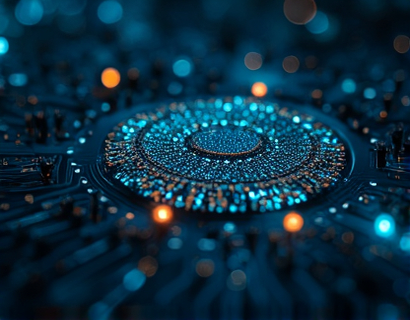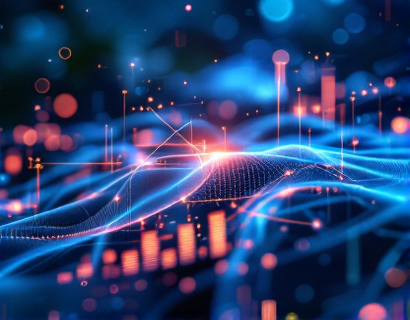Revolutionizing Productivity: The Synergy of Crypto and AI
The intersection of cryptocurrency and artificial intelligence (AI) is giving rise to a new era of digital transformation, one that promises to revolutionize productivity and simplify daily tasks for tech-savvy innovators and early adopters. This article delves into the cutting-edge marketplace where these two transformative technologies converge, offering advanced applications and services that harness the power of blockchain and machine learning to create a more efficient and connected digital world.
The integration of cryptocurrency and AI is not just a technological curiosity but a practical solution to some of the most pressing challenges in the digital landscape. By combining the decentralized, secure, and transparent nature of blockchain with the intelligent, adaptive capabilities of AI, developers are creating tools that not only enhance productivity but also ensure data integrity and user privacy. This synergy is particularly appealing to tech enthusiasts and early adopters who are eager to explore and leverage the latest advancements in digital technology.
Understanding the Basics: Cryptocurrency and AI
To fully appreciate the potential of this convergence, it's essential to understand the fundamental concepts of both cryptocurrency and AI. Cryptocurrency, such as Bitcoin and Ethereum, operates on a decentralized network known as a blockchain. This technology ensures that transactions are secure, transparent, and tamper-proof, eliminating the need for intermediaries like banks. The use of cryptographic algorithms and consensus mechanisms like Proof of Work or Proof of Stake guarantees the integrity of the blockchain.
AI, on the other hand, involves the development of algorithms and machine learning models that enable computers to perform tasks that traditionally required human intelligence. These tasks include pattern recognition, natural language processing, and decision-making. AI systems can learn from data, adapt to new inputs, and perform actions that mimic human cognitive functions. The combination of these two technologies opens up a world of possibilities for creating smart, autonomous, and highly efficient digital solutions.
The Role of Blockchain in Enhancing AI Applications
One of the key ways blockchain enhances AI applications is through data management and security. AI models require vast amounts of data to train and improve their performance. Blockchain provides a secure and decentralized way to store and share this data, ensuring that it remains intact and accessible only to authorized parties. Smart contracts, self-executing contracts with the terms directly written into code, can automate data sharing and access control, reducing the risk of data breaches and ensuring compliance with regulations.
Moreover, blockchain can address the issue of data bias, a common challenge in AI. By using decentralized data sources and transparent algorithms, AI systems can be trained on more diverse and representative datasets, leading to fairer and more accurate outcomes. This is particularly important in applications like financial services, healthcare, and autonomous vehicles, where the reliability of AI is critical.
AI-Powered Tools for Enhanced Productivity
The fusion of AI and blockchain is giving birth to a new generation of productivity tools designed to streamline workflows, automate repetitive tasks, and provide actionable insights. These tools leverage AI's ability to analyze complex data sets and blockchain's secure and transparent nature to deliver robust solutions.
One such application is intelligent project management software. Traditional project management tools often struggle with data silos and manual data entry, leading to inefficiencies and errors. An AI-powered project management platform can integrate data from various sources, automatically update project statuses, and predict potential bottlenecks. Blockchain ensures that all data is secure and tamper-proof, providing a reliable foundation for decision-making.
Another example is automated customer service through AI-driven chatbots. These chatbots can handle a wide range of customer inquiries, from simple questions to complex issues, providing instant and accurate responses. By integrating blockchain, these chatbots can verify user identities and transaction histories, enhancing security and personalization. This not only improves customer satisfaction but also reduces the workload on human support teams.
Smart Contracts for Streamlined Business Processes
Smart contracts are a powerful application of blockchain that can significantly enhance business processes. These self-executing contracts automatically enforce and execute the terms of an agreement when predefined conditions are met. When combined with AI, smart contracts can become even more intelligent and adaptive.
For instance, in supply chain management, smart contracts can track the movement of goods in real-time, ensuring transparency and accountability. AI algorithms can analyze data from sensors and other sources to predict delays, optimize routes, and manage inventory levels. When a delay is detected, the smart contract can automatically trigger compensatory actions, such as adjusting delivery schedules or notifying stakeholders, all without human intervention.
In the realm of finance, smart contracts can automate complex transactions like loans, insurance claims, and payments. AI can analyze risk factors and market conditions to determine the terms of the contract, ensuring that they are fair and compliant with regulations. This not only speeds up the process but also reduces the risk of fraud and errors.
Decentralized Identity and Privacy Protection
Privacy is a major concern in the digital age, and the combination of AI and blockchain offers robust solutions to protect user data. Decentralized identity systems, powered by blockchain, allow users to control their personal information and decide who can access it. AI can enhance these systems by analyzing user behavior and detecting anomalies, providing an additional layer of security.
For example, a decentralized identity platform can use AI to generate unique digital identities for users, ensuring that their personal data is not compromised. These identities can be used across various services, from online banking to social media, without the need to repeatedly enter sensitive information. Blockchain ensures that these identities are secure and immutable, while AI helps in continuously monitoring and updating security measures.
The Future of Work: AI and Blockchain in Enterprise Solutions
The impact of AI and blockchain extends beyond consumer applications to the enterprise sector, where they are transforming the way businesses operate. AI-driven analytics and blockchain-based data management are revolutionizing industries such as finance, healthcare, and manufacturing.
In finance, AI-powered trading platforms can analyze market data in real-time, making informed decisions and executing trades with high precision. Blockchain ensures that all transactions are recorded transparently and securely, reducing the risk of fraud and enhancing trust among participants. Smart contracts can automate trade execution and settlement, reducing the need for intermediaries and lowering transaction costs.
In healthcare, AI can analyze vast amounts of medical data to assist in diagnosis and treatment planning. Blockchain can securely store and share patient records, ensuring that healthcare providers have access to accurate and up-to-date information. This not only improves patient care but also enhances research and development efforts by providing a rich source of anonymized data.
In manufacturing, AI and blockchain can optimize supply chains and production processes. AI algorithms can predict maintenance needs, optimize production schedules, and detect quality issues in real-time. Blockchain ensures that all data related to production and logistics is transparent and tamper-proof, enabling better coordination and accountability among supply chain partners.
Challenges and Considerations
While the potential of AI and blockchain is immense, there are several challenges and considerations that need to be addressed. One of the primary challenges is the technical complexity of integrating these technologies. Developers and organizations must have a solid understanding of both blockchain and AI to create effective solutions.
Another challenge is the regulatory landscape. As these technologies are still evolving, regulations are often lagging behind. Ensuring compliance with existing laws and advocating for clear and supportive regulations is crucial for the widespread adoption of AI and blockchain solutions.
Scalability is also a significant concern. Blockchain networks, particularly those using Proof of Work, can face performance issues as the number of transactions increases. AI systems, especially those requiring extensive data processing, need robust infrastructure to handle large-scale operations efficiently. Innovations in blockchain, such as layer 2 solutions and alternative consensus mechanisms, along with advancements in AI hardware, are addressing these scalability issues.
Conclusion
The convergence of cryptocurrency and AI is paving the way for a new era of digital transformation, offering powerful tools that enhance productivity and simplify daily tasks. By leveraging the strengths of both technologies, we can create more secure, efficient, and user-friendly digital solutions. For tech-savvy innovators and early adopters, this is an exciting time to explore and contribute to this evolving landscape. As the marketplace for AI and blockchain continues to grow, the opportunities for innovation and impact will only increase.










































